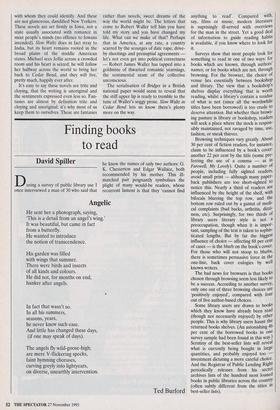A nation weeps
Erica Wagner
SLOW WALTZ IN CEDAR BEND by Robert James Waller Heinemann, f9.99, pp. 197 Robert James Waller is clearly a man With a knack for sniffing the zeitgeist on the wind. A little over 25 years ago, Robert Kennedy plucked Bobby Waller from obscurity and set him on the back of his campaign train, playing his guitar and singing as Kennedy rode through the Mid- west. Kennedy was killed, and Waller bided his time for a while — until April of last Year to be precise, when his first novel, The Bridges of Madison County, was published in the United States.
The numbers are as important as the books. It was written in a whirlwind two weeks; 4,000 copies were sent out, free of charge, to independent booksellers across the United States; and before very long the little novel had sold 450,000 copies and was at the top of the New York Times bestseller list: Bridges has since been reprinted 23 times. Waller's fan mail arrives in sacks; Spielberg has bought the rights. One last number to keep in mind is that The Bridges of Madison County, published last Year in this country under the title Love in Black and White, sold a scant 2,000 Copies.
In Slow Waltz in Cedar Bend, Waller's new novel, Michael Tillman is a romantic hero for the Nineties: a hard man on his vintage Shadow bike who's never been good at 'taming the Y chromosome', as he puts it . . . but observe him in his crusade to rescue the campus ducks when their Pond is threatened: they don't come more caring than this. Jellie Braden may be mar- ried to the doltish Jim, but she's got a life of her own, and how — yearly trips to India by herself, a mysterious past she can't quite abandon. Note well that the lovers are both past 40: Francesca Johnson and Robert Kincaid, the lovers in the first novel, were of similar ages (Francesca, in fact, looks back on her love affair from the vantage Point of 67 years). It is this which in great part must account for the success of the book, and will doubt- less contribute to the success of Slow Waltz. Advertisers call it 'generational marketing': all unwitting, Waller aimed his first novel at the huge numbers of American readers really stuck for characters of their own age with whom they could identify. And these are not. glamorous, dandified New Yorkers. These novels are set firmly in Iowa, not a state usually associated with romance in most people's minds (no offence to Iowans intended). Slow Waltz does in fact stray to India, but its heart remains rooted in the broad plains of the middle American states. Michael sees Jellie across a crowded room and his heart is seized; he will follow her halfway across the world to bring her back to Cedar Bend, and they will live, pretty much, happily ever after.
It's easy to say these novels are trite and cloying, that the writing is unoriginal and the sentiments expressed even less so. Fan- tasies are almost by definition trite and cloying and unoriginal: it's why most of us keep them to ourselves. These are fantasies rather than novels, sweet dreams of the way the world might be. The letters that come to Robert Waller tell him you have told my story and you have changed my life. What can we make of that? Perhaps that in America, at any rate, a country scarred by the scourges of date rape, drive- by shootings and prenuptial agreements let's not even get into political correctness — Robert James Waller has tapped into a goldmine of thwarted romantic yearnings, the sentimental seam of the collective unconscious.
The serialisation of Bridges in a British national paper would seem to reveal that the stiff upper lip is ready to tremble to the tune of Waller's soggy prose. Slow Waltz in Cedar Bend lets us know there's plenty more on the way.











































































 Previous page
Previous page